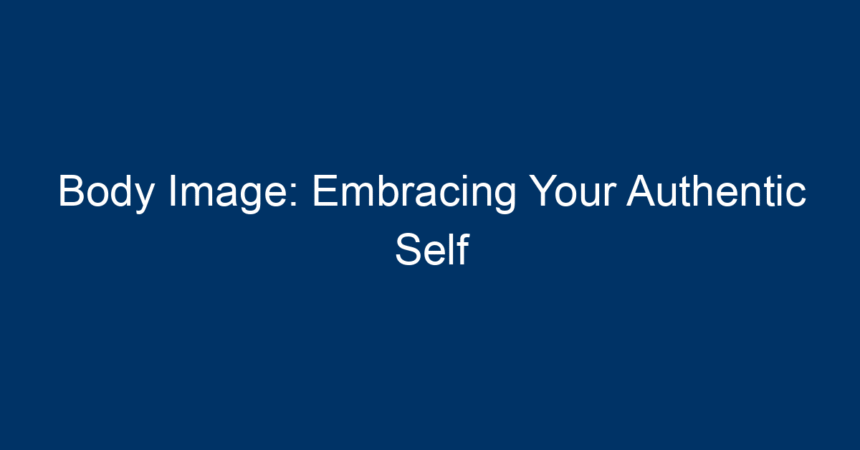Introduction
In a world saturated with images of idealized beauty, the concept of body image has become increasingly complex. It goes beyond physical appearance; it’s a reflection of how we perceive ourselves and how we believe others perceive us. This article dives deep into the significance of body image, navigating the important journey of embracing your authentic self. Understanding body image is key to fostering a positive self-view and leading a fulfilling life.
Understanding Body Image
What is Body Image?
Body image refers to the internal sense of our physicality intertwined with self-esteem and confidence. It’s shaped by various factors, including cultural ideals, media representation, personal experiences, and social interactions. A positive body image fosters self-acceptance, while a negative body image can lead to issues such as anxiety, depression, and eating disorders.
The Impact of Media on Body Image
From glossy magazine covers to viral social media posts, media plays a pivotal role in shaping our perceptions of beauty. The constant exposure to curated images can create unrealistic standards. When we compare ourselves to these ideals, it’s easy to feel inadequate. Understanding media influence is essential in reshaping the narrative around our bodies.
Factors Influencing Body Image
Cultural Norms and Standards
Cultural backgrounds significantly affect our views on body image. Different cultures have distinct beauty standards, which may promote body positivity or perpetuate harmful stereotypes. Recognizing these cultural influences encourages a broader understanding of beauty beyond societal norms.
Social Interactions
Our interactions with family, friends, and society can greatly affect how we view our bodies. Positive reinforcement from loved ones can enhance body positivity, while negative comments can deeply impact self-esteem. Building a supportive environment can reinforce a healthy body image.
Personal Experiences
Personal experiences, including childhood interactions and past traumas, shape our self-perception. Reflecting on these experiences can provide insights into how they influence our current body image. Journaling or talking with a therapist can help navigate these feelings.
Embracing Your Authentic Self
Acknowledging Your Feelings
The first step in embracing an authentic self is to acknowledge your feelings about your body. Accepting that you have insecurities is not a weakness; it’s a part of being human. This recognition allows room for self-compassion and growth.
Celebrating Individuality
Every body is unique, shaped by genetics, lifestyle, and experiences. Celebrate your individuality by recognizing what makes you, YOU. Focus on your strengths and the aspects of yourself that you love, rather than dwelling on perceived flaws.
Challenging Negative Thoughts
Cognitive Behavioral Therapy (CBT) techniques can be highly effective in challenging negative thoughts related to body image. When a critical thought arises, evaluate its validity. Ask yourself if it’s based on facts or comparisons. Replacing negative thoughts with positive affirmations can gradually reshape your mindset.
Surrounding Yourself with Positivity
Cultivating a positive environment is crucial for nurturing a healthy body image. This includes unfollowing social media accounts that promote unrealistic standards and surrounding yourself with individuals who uplift and inspire you. Seek out body-positive communities that resonate with your values.
Strategies for a Positive Body Image
Practicing Self-Care
Self-care goes beyond physical appearance; it’s about nurturing your mind and spirit. Engage in activities that promote well-being, such as yoga, meditation, or hobbies that bring you joy. Investing in self-care helps foster a nurturing relationship with yourself.
Setting Realistic Goals
Instead of striving for an unattainable body, focus on setting realistic well-being goals. This might include improving your physical fitness, eating nutritious foods, or practicing mindfulness. Celebrate small victories along the way, reinforcing a positive self-view.
Embracing Body Neutrality
Body neutrality encourages appreciation for what your body can do rather than focusing on its appearance. Shift your attention from looks to functionality. For instance, appreciate your body’s ability to move, engage in activities, or recover from illness. This mindset can alleviate the pressure to conform to societal standards.
Finding Role Models
Look for role models who embrace body positivity and authenticity. Follow individuals who celebrate diverse body types and promote messages of self-acceptance. Their stories can inspire and motivate you in your journey toward embracing your authentic self.
The Connection Between Body Image and Mental Health
Mental Health Challenges
Negative body image is often linked to mental health issues such as anxiety, depression, and eating disorders. It’s crucial to understand the profound connection between how we perceive our bodies and our overall mental well-being. Recognizing the signs of mental health struggles is the first step toward seeking help.
The Power of Therapy
If you’re struggling with body image issues, consider seeking support from a mental health professional. Therapy can provide tools to combat negative self-perceptions and develop coping strategies. Cognitive Behavioral Therapy (CBT) is particularly beneficial for addressing distorted thinking patterns surrounding body image.
Conclusion
Embracing your authentic self and fostering a positive body image is a journey that requires patience, self-compassion, and courage. By understanding the influences on your body image and actively challenging negative perceptions, you can cultivate a healthier relationship with yourself. Celebrate your individuality, practice self-care, and surround yourself with positivity. Remember, our worth extends beyond mere appearance—it’s rooted in who we are at our core.
Actionable Insights
- Reflect on Your Body Image: Journal about your feelings and experiences related to your body image.
- Limit Exposure to Unrealistic Media: Unfollow accounts that promote harmful beauty standards.
- Engage in Positive Affirmations: Practice daily affirmations to reinforce a positive self-image.
- Seek Professional Support: If body image concerns impact your mental health, consider therapy for guidance.
By taking these steps, you can foster a more authentic and compassionate relationship with your body. Embrace your journey towards self-acceptance, and let your authentic self shine brightly.




